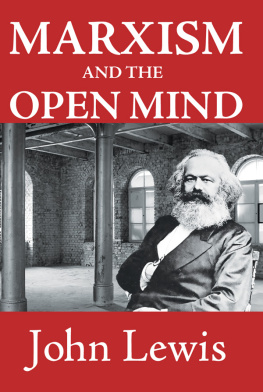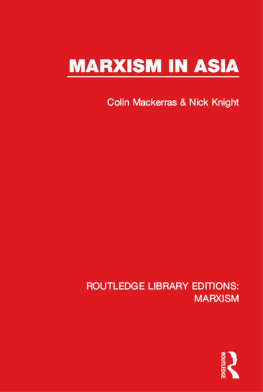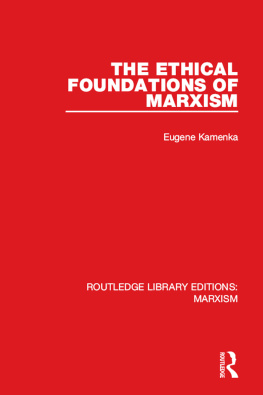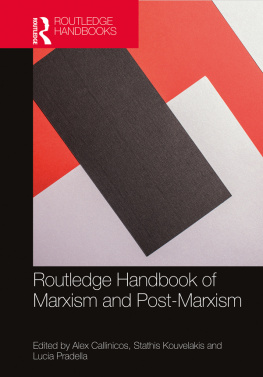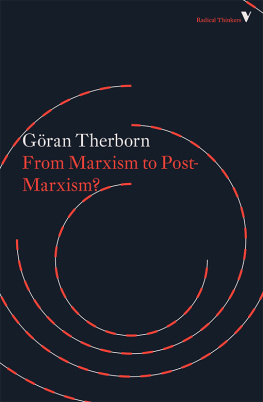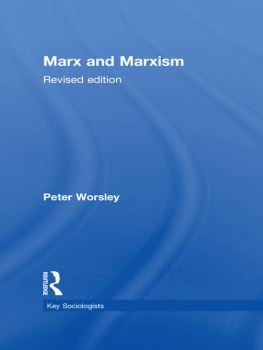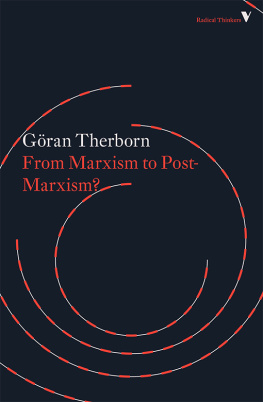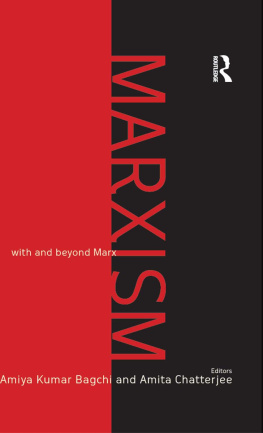Christianity and Marxism
Christians and Marxists have cooperated in various forms of political work in recent decades, and after earlier years of antagonism thinkers on both sides have come to take each other seriously. Andrew Collier's ground-breaking book analyses how Christianity and Marxism can meet in terms of their philosophical positions, without watering either down, but at their full strength.
After discussing what Christianity and Marxism are, and their place amongst contemporary world outlooks, the book discusses four areas of apparent conflict and possible reconciliation:
Dialectical materialism and the Christian view of the universe as God's fallen creation
Marx's commitment to secularist politics
Marx's description of religion as the opium of the people
The ethics of revolution compared with the ethics of the Sermon on the Mount
Collier argues that Christianity and Marxism are, or can be brought, closer than is commonly thought. He concludes with a discussion of the ways in which both movements can be made truer to themselves by learning from each other, and how they can consequently be more effective in their projects of human liberation. This book is the first to consider the philosophical issues at stake in the Christian/Marxist dialogue for seventy years, and will be of great interest to all those involved in philosophy, theology, politics and Marxism, including the philosophy of politics, the philosophy of religion, and liberation theology.
Andrew Collier is Professor of Philosophy at the University of Southampton and has previously lectured at Warwick, Sussex and Bangor Universities. His recent publications include Socialist Reasoning, Critical Realism and Being and Worth.
Christianity and
Marxism
A philosophical contribution to
their reconciliation
Andrew Collier
First published 2001
by Routledge
2 Park Square, Milton Park, Abingdon, Oxon, OX14 4RN
Simultaneously published in the USA and Canada
by Routledge
270 Madison Ave, New York NY 10016
Routledge is an imprint of the Taylor & Francis Group
Transferred to Digital Printing 2007
2001 Andrew Collier
Typeset in Sabon by
Florence Production Ltd, Stoodleigh, Devon
All rights reserved. No part of this book may be reprinted or reproduced or utilised in any form or by any electronic, mechanical, or other means, now known or hereafter invented, including photocopying and recording, or in any information storage or retrieval system, without permission in writing from the publishers.
British Library Cataloguing in Publication Data
A catalogue record for this book is available from the British Library
Library of Congress Cataloging in Publication Data
Collier, Andrew, 1944-
Christianity and Marxism: a philosophical contribution to their reconciliation / Andrew Collier.
p. cm.
Includes bibliographical references and index. 1. Communism and Christianity. 2. Communism and philosophy. I. Title. HX536 .C713 2001
ISBN10: 0-415-25191-5 (hbk)
ISBN10: 0-415-43456-4 (pbk)
ISBN13: 978-0-415-25191-4 (hbk)
ISBN13: 978-0-415-43456-0 (pbk)
Publisher's Note
The publisher has gone to great lengths to ensure the quality of this reprint but points out that some imperfections in the original may be apparent
Contents
I'll ha'e nae hauf-way hoose, but aye be whaur
Extremes meet it's the only way I ken
To dodge the cursed conceit o' bein' richt
That damns the vast majority o' men.
Hugh MacDiarmid, from
A Drunk Man Looks at the Thistle
1 On philosophy and world views
The aim of this book is to make clear the philosophical relations between the Christian and Marxist world outlooks, with a view to showing to what extent they can be reconciled. At the present time, indeed, Marxism and Christianity do not look like the two leading contenders for dominant world view, at least in Europe and North America. The other two world views that I shall describe shortly - liberalism and neo-paganism - are both more fashionable. But fashion is no guide to truth, and anyway there are large parts of the Third World' where Christianity and Marxism are very much alive and kicking. And one thing both views have in common is the belief that having a large share of this world's goods is not conducive to insight into truth!
But here a question arises, with which the argument of this book begins: whatever points of contact and dialogue there may be between Christianity and Marxism, they are not usually on philosophical ground. And when they are, it is usually the wrong sort of Christianity which meets the wrong sort of Marxism on the ground of the wrong sort of philosophy. A Pelagian Christianity can meet a Feuerbachian Marxism on the ground of an anthropocentric philosophy, and confirm each other in their humanist errors. But I want to make Lenin and Althusser meet Augustine and Luther!
First, I shall say some general things about philosophy and world views, most of which will need filling out and justifying later in the book.
I
Marxist philosophy, or at least that tradition of it in which I have worked, denies that philosophy has any special method (though there may be styles of argument that are more often met with in philosophy than elsewhere), or that it has access to any special body of truths. This conception contrasts with that of modern (as opposed to recent) philosophy, i.e. with the philosophies of the seventeenth and eighteenth centuries, and of those who have continued those traditions. Those philosophies are now commonly called foundationalist: they believe that knowledge has foundations, i.e. that certain parts of knowledge, acquired by specific methods, are indubitable, and form the basis of all knowledge. Cartesian rationalism with its attempt to deduce knowledge from indubitable axioms like geometry, empiricism with its incorrigible sense data, Kant's synthetic a priori, are all versions of this. But much recent philosophy is a mirror image of this foundationalism, and shares its failings: it does not claim to deal in indubitable truths, but it does claim to expose indubitable falsehoods, i.e. to show that much that others have thought true is not (or not just) false, but meaningless, nonsense. Philosophy ceases to be about truth and falsity and becomes about sense and nonsense. The contradictory to a piece of nonsense is treated as having the same certainty as Cartesian clear and distinct ideas or phenomenalist sense datum statements were supposed to have.
Marxist philosophy at its best has resisted both foundationalism and negative foundationalism. It is not about sense and nonsense, nor yet about certainty and dubitability, but about truth and falsity. How then does it differ from non-philosophical areas of knowledge? Simply in that it has no special means of verifying or falsifying its ideas, such as experiments, or mathematical proofs. Its premisses are the results, explicit or implicit, of other practices. They are beliefs that we have good grounds for holding (grounds provided by other disciplines, or simply by everyday activities). But they give rise to philosophical problems because they


